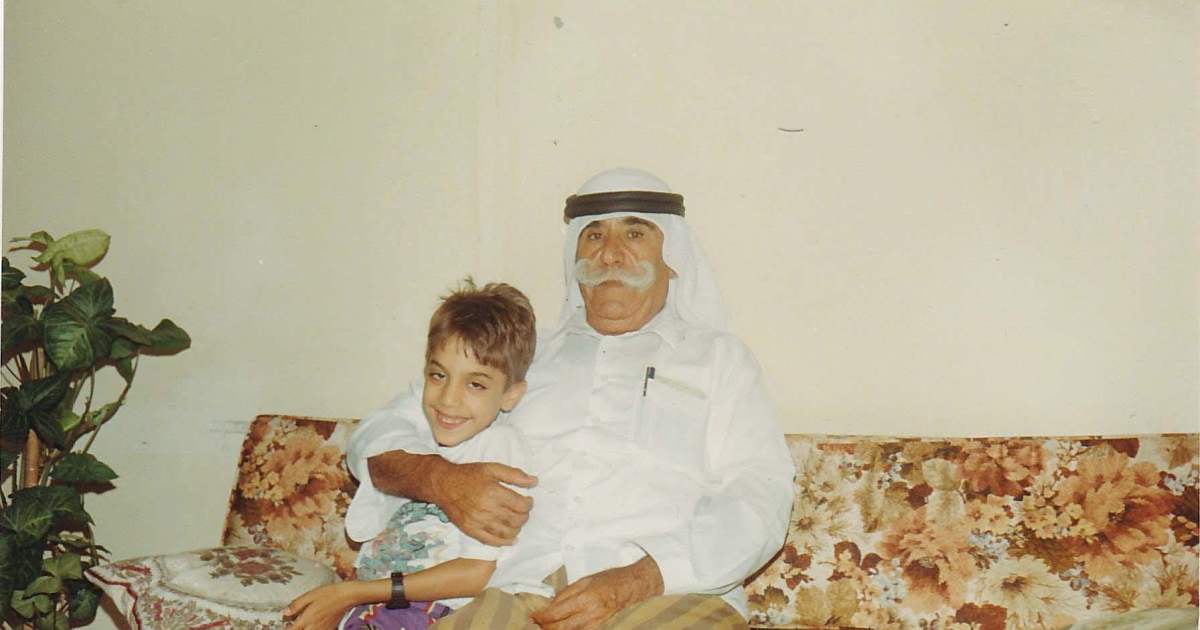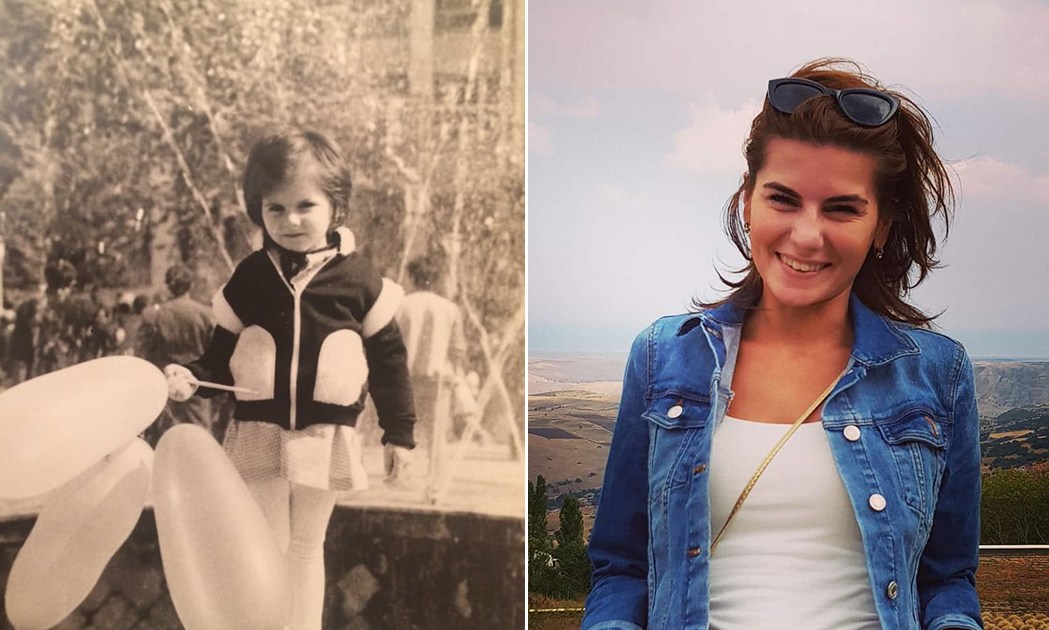The personal is political: A journey through Palestinian exile | Middle East News
“ … In Palestinian dialect, ghurba is synonymous with the word “exile”, and as a concept it signifies issues such as dislocation and expulsion from one’s home, family and community … And it does this not only in terms of a different mode of being, a temporal and an existential circumstance, but also as a spatial geopolitical process of forced removal in which the Palestinian subject, to borrow Edward Said’s terminology, is continually put “out of place” in the present.”
Ihab Saloul, Catastrophe and Exile in the Modern Palestinian Imagination: Telling Memories
I am a Canadian-born citizen of Palestinian origin.
My family are Palestinian refugees of Lebanon, where both my parents were born and raised in refugee camps.
My grandparents were ethnically cleansed from the village of Suhmata under Operation Hiram, an expulsion campaign executed by the Golani Brigade on October 30, 1948.
My identification card issued by the Republic of Lebanon to keep intergenerational records of Palestinians of Lebanon is the only document in my possession that proves my stateless Palestinian identity.
 A copy of the writer’s refugee ID card [Photo courtesy of Ahmad Moussa]
A copy of the writer’s refugee ID card [Photo courtesy of Ahmad Moussa]Canada to the UAE: No place to return to
My parents became citizens of Canada after escaping during the height of the Lebanese Civil War in the early 1980s. My father had secured a scholarship to study in Canada. As for many Palestinians, education was his only avenue out.
When he first travelled to Manitoba he spent a night in transit in New York, accompanied at all times by a US Marshal who stayed in the same room and controlled his travel documents until he boarded his onward flight. He was subjected to this heightened level of security in response to the 1983 bombings by Hezbollah of barracks in Beirut that killed more than 200 US Marines.
Upon his arrival, he learned that the expected funding for his Masters in Atomic Physics at the University of Manitoba was no longer available. But the faculty funded his studies so that he was able to stay in Canada and eventually establish his refugee status, preventing his return to a civil war in a country hostile towards Palestinian refugees. My mother, however, was trapped in Beirut for a further five months of intense and bloody conflict, by curfews and closures of airports and roads. She later described to us how the streets were deserted but for the snipers who hid everywhere.
Already traumatised by the civil war and the hardships of being Palestinian in Lebanon, my parents – like most refugees and new immigrants trying to resettle in Canada – now faced the almost impossible task of trying to support our family without social assistance. As well-educated and highly skilled as they were, it was too hard. I recall one story about how my father tried to find work with NASA but was told bluntly that he could not be employed there because of his ethnic background.
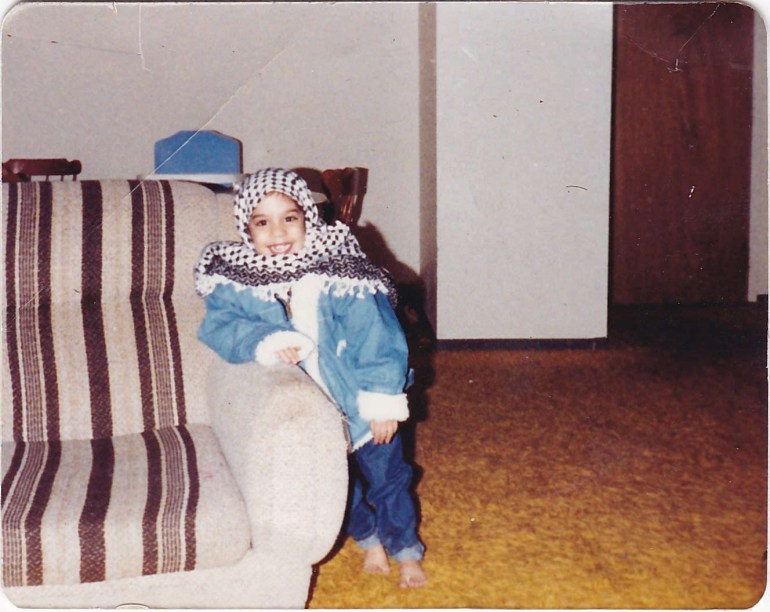 The writer as a child in Canada [Photo courtesy of Ahmad Moussa]
The writer as a child in Canada [Photo courtesy of Ahmad Moussa]So, when I was five years old – after seven years in Canada – my father secured a position in the United Arab Emirates (UAE). We knew that as foreigners in the country, every opportunity was temporary and that it was inevitably going to come to an end. But what makes the Palestinian experience different to that of others is that there is no place of belonging to return to. That thought always lingered in the back of our minds, along with the knowledge that each move would take us further from our community and extended family.
As we were travelling to the UAE in August 1990, almost half a million Palestinian refugees were being expelled from Kuwait, in retaliation for Iraqi president Saddam Hussein’s invasion. Palestine Liberation Organization (PLO) leader Yasser Arafat’s stance of siding with Saddam Hussein during the war led to the retaliation against Palestinians. On our arrival in the UAE, we were faced with an airport overcrowded with frightened and displaced Kuwaiti and Saudi nationals. I remember feeling something that I would feel repeatedly throughout my life: the need to hide that I was Palestinian.
Lebanon: ‘Take the keffiyeh off your head’
Almost every summer we would spend three months in or near the Palestinian refugee camps in various parts of Lebanon with members of my extended family.
My grandfather had many ways of commanding respect for his culture and identity as a Palestinian and resisting erasure of who we are as a people.
When I was about eight or nine years old, my grandfather, who was hired by the UN agency for Palestinian refugees, UNRWA, to oversee infrastructure maintenance at the Rashidiya camp where he lived, relayed an encounter he had had with a high-level European UNRWA employee.
“Take the keffiyeh off your head,” this person had told him.
My grandfather answered with a question: “Are you someone who will wear the keffiyeh on your head?”
“No,” the UNRWA employee replied.
“The same way that you are unable to wear it, I am unable to remove it,” my grandfather responded.
I remember how he would walk through the orchards and groves near the camp with me, sharing stories of Suhmata and teaching me about land stewardship and its riches, recalling our way of life as falaheen (farming). It was in one of those moments that I realised what my authentic identity felt like. Indigenous peoples call this heart and blood memory; something felt although not tangibly present.
I remember too the silence that filled the gathering of extended family when my grandfather expressed his approval of my aptitude in English at such a young age. He boasted about his own fluency and went on to state, “F****** Arabs,” repeating what was said to him during the ethnic cleansing campaigns, without understanding its significance, and reminding everyone of the Zionist-British colonial collusion.
 A Palestinian refugee student peers from behind a United Nations Relief and Works Agency (UNRWA) school door at Ain al-Hilweh refugee camp in southern Lebanon [File: Ali Hashisho/Reuters]
A Palestinian refugee student peers from behind a United Nations Relief and Works Agency (UNRWA) school door at Ain al-Hilweh refugee camp in southern Lebanon [File: Ali Hashisho/Reuters]Another clear memory is of being at the UNRWA administrative office in the Rashidiya refugee camp when I was about 12 years old with my late aunt who was struggling with cancer and trying to secure coverage for chemotherapy-related medication. She was told that since she was “likely to die”, medical rationing was something they had to do, given the constant threat to the organisation’s budget.
Canada redirected its contributions (giving them to the security project of then Palestinian Authority Prime Minister Salam Fayyad instead of UNRWA) in 2010 under the Harper government in the name of fighting terrorism, and we see the Trump administration doing the same. This contributes to a long-standing financial crisis which cripples the organisation’s ability to meet the basic needs of Palestinian refugees, with particularly dire consequences for those in Lebanon, which has the most troubled political circumstances of all the host countries.
This approach illuminates the difference between contributing to a policy of exile and estrangement versus a policy of solidarity. Supporting Palestinians in having basic social justice as stateless people in a hostile host country is a show of solidarity as opposed to using it as a tool to scapegoat and impose political pressure under the guise of “fighting terrorism”.
Lebanon or Canada? A degrading predicament
After contributing 11 years of his life to the education sector in the UAE my father’s contract was ended and we were given 10 days to leave the country. It was the summer of 2001 and I was 16 years old.
There was no good choice about where to ship our belongings given the predicament of placelessness and constant consideration of potential political scapegoating that comes with being a Palestinian.
Initially, we travelled to Lebanon for the summer, after which my parents’ two options were to remain close to family in or near the refugee camps, relying on UNRWA and incurring the high cost of sending my siblings and me to Lebanese schools or to travel to Canada, where we could attend public schools and university at a lower cost.
 Palestinian children look out of the door of their house in Shatila refugee camp in Beirut on March 3, 2010. The camp was set up by UNRWA in 1949 [File: Jamal Saidi/Reuters]
Palestinian children look out of the door of their house in Shatila refugee camp in Beirut on March 3, 2010. The camp was set up by UNRWA in 1949 [File: Jamal Saidi/Reuters]The predicament lies in choosing between having greater resources but further geographical and communal exile or remaining geographically and communally closer but with fewer resources. When I reflect on these options, I realise that both are degrading in their own way – because neither of them are our place of belonging.
We left for Canada in August 2001 and even though we are Canadian citizens, we arrived back in Winnipeg like we were new refugees. After being away for more than a decade, it was like starting over again. We checked into the nearest motel. It was a complete culture shock. Having to build a sense of home again from scratch felt like a present-day Nakba, an experience that is constant in the lives of Palestinians due to the absence of a genuine place for us.
A post-9/11 world: Islamophobia and anti-Palestinian racism
One month after our arrival, the unfortunate events of September 11 took place, just as I was starting grade 11.
My entire experience post-9/11 has been affected by ongoing Islamophobia, on top of the ever-present anti-Palestinian racism. This took many shapes and forms from racial slurs and violence to being shut out from spaces and having our experiences and existence denied; all of which and more combined to ensure the insult of estrangement and invisibility was added to the injury of prolonged exile.
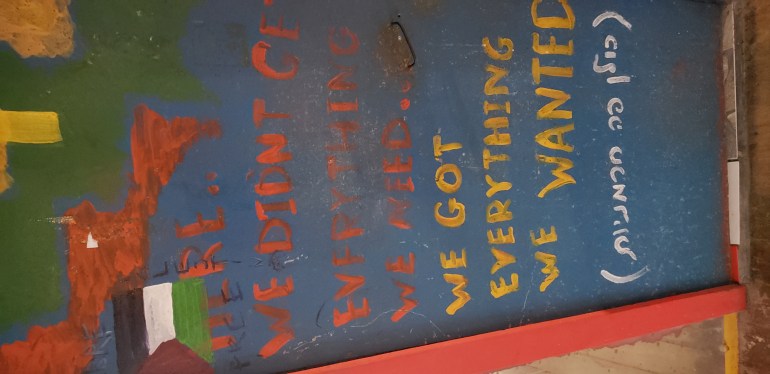 A hostel door in Costa Rica shows a painting of Palestine with the message ‘We didn’t get everything we need … We got everything we wanted’ [Photo courtesy of Ahmad Moussa]
A hostel door in Costa Rica shows a painting of Palestine with the message ‘We didn’t get everything we need … We got everything we wanted’ [Photo courtesy of Ahmad Moussa]Consequently, in high school and for several years after, I lashed out – engaging in fights and speaking out against authority figures who operated or supported the politics of impunity. I was almost expelled, was at risk of not graduating and was labelled a delinquent.
I was seen by much of society as “criminalised”; someone who needed to be shown morals, values and ethics. In truth, I was and continue to be a product of prolonged Zionist criminality that penetrates from the political all the way to the communal, societal, familial and personal. I have been trying to expose this by criticising the state-sanctioned laws and policies that are hostile and marginalising as opposed to empowering, by trying to build alliances, pursuing higher education and engaging in raising awareness. Yet even these spaces are uninviting because they are tainted with Zionist ideology.
Despite these experiences, the value of education for me and all Palestinians is undeniable because it equips us as a people to leverage our socioeconomic options while simultaneously having our cause go from the invisible to the visible through engagement and raising awareness to an international audience. Even in my darkest moments, I never let go of my genuine love for knowledge and truth seeking.
Indigenous advocacy: A place to belong
I studied political science and international development studies in my undergraduate years and began to learn the history of Indigenous people in Canada. I felt a sense of belonging in our joint struggle as I realised Indigenous people were experiencing the same settler colonialism in Canada as we Palestinians. As Arafat explained in his speech at the UN General Assembly in 1974 (which led to the annual observance of the day of Solidarity on November 29), Palestinian indigeneity is under siege by the Zionists, a siege that seeks to erase it through perpetual estrangement and exile.
I began street-level advocacy work that fought for Indigenous prisoners to be freed through prison visitations and drafting bail plans that I would present to judges in court, fighting social welfare offices for denying people basic needs support related to housing, employment or any other social justice issues. Most importantly, through my work in the transitional justice process known as the Residential School Settlement Agreement, I guided them through a legal process created to compensate Indigenous people for the policy of forcing Indigenous children to attend residential schools that sought to separate them from their families and communities and to strip them of their culture, language and identity, with often deeply traumatic and sometimes deadly consequences.
My advocacy work for prisoners, homeless people, addicts and others who are affected by the traumatising political frameworks and consequences of past and present processes of colonialism was where I felt a sense of belonging as a Palestinian, from both a moral and legal standpoint.
I was twice contacted by the Canada Security Intelligence Service and questioned about the nature of my work on behalf of Indigenous prisoners – did I know any radicals in prison, I was asked – and my views on matters such as the banning of the niqab.
Academia: Saturated with Zionism
I pursued a master’s degree in development practice in Indigenous development at the University of Winnipeg, but felt my contributions were silenced and suppressed as I brought the Indigenous lens to our cause and thus disturbed the Zionist ideology that saturated academia.
 A bust of Yitzhak Rabin in the ‘Garden of Nations’, Costa Rica [Photo courtesy of Ahmad Moussa]
A bust of Yitzhak Rabin in the ‘Garden of Nations’, Costa Rica [Photo courtesy of Ahmad Moussa]In 2012, I transitioned to a master of arts in international jaw, human rights and Indigenous rights at the UN-mandated University for Peace in Costa Rica. To my disbelief, the University has a display known as the “Garden of Nations”, consisting of busts of heads of state considered role models for peace. Among them were David Ben-Gurion, the architect of the ethnic cleansing of Palestinians, and Yitzhak Rabin, a participant in the ethnic cleansing as a member of the Palmach, a commando unit of the Haganah, who later devised the policy of breaking Palestinians’ bones.
Nova Scotia: Walking the trail
My next move was to the Canadian province of Nova Scotia, home to a well-established Lebanese Maronite Christian community, many of whom came to the country during the Lebanese civil war. I found my familiarity with Lebanon welcome there; my Palestinian identity, however, was not. For me, it was a reminder of the Sabra and Shatila massacre in September 1982 when, over the course of two days, members of the right-wing Christian Phalange militia killed hundreds, or possibly thousands, of mainly Palestinian civilians in the camps as Israeli troops surrounded them to stop anyone from fleeing.
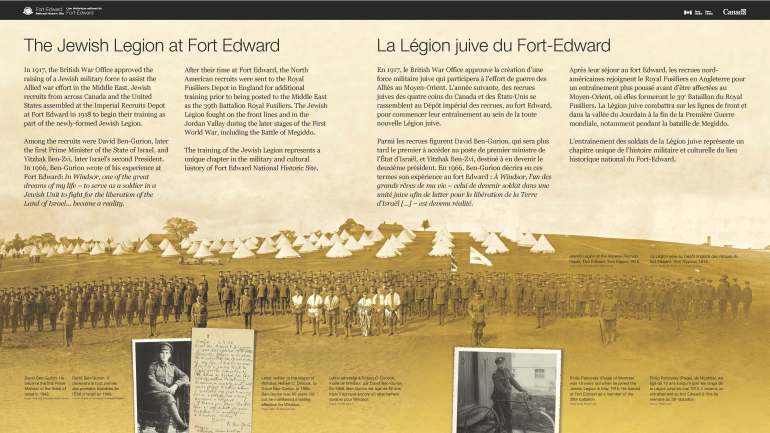 The official historical plaque by the Canadian government of David Ben Gurion [Photo courtesy of Ahmad Moussa]
The official historical plaque by the Canadian government of David Ben Gurion [Photo courtesy of Ahmad Moussa]Another unexpected discovery I made there was that David Ben-Gurion and Yitzhak Ben-Zvi, later president of Israel, were members of the Jewish Legion, battalions of volunteers who fought for the British army against the Ottoman Empire during World War I, once located at Fort Edward in Windsor, Nova Scotia. My relocation had, it seemed, taken me back to the point of origin of our Nakba story – to where the pre-Nakba training for the ethnic cleansing of my grandparents occurred. I visited the site on Remembrance Day in Canada, which is observed annually on November 11, as I wanted to engage in my own form of remembrance.
It was a strange experience; one that both opened and closed wounds. What struck me was that it was clearly a very strategic site, located on a hilltop overlooking the town of Windsor. I followed the walking trail there, knowing that those responsible for the crimes against my people had walked that same path before me.
Solidarity: Alleviating exile and estrangement
In all of this, the question remains: where is my space or place of belonging as a Palestinian? I am exiled in academia. I am exiled historically and narratively. I am exiled politically, socially and geographically. I am exiled among other racialised and oppressed groups. There is no space for me, literally and metaphysically. It is the constant experience of belonging everywhere and nowhere. For Palestinians, the personal is political.
One way to show solidarity with our cause is to actively attempt to eradicate our personal ‘ghurba’ (estrangement). People can do this by standing behind us or beside us, but not in front of us.
Solidarity is listening to our story and providing a genuine space for our narrative. Solidarity is levelling the playing field for us. Solidarity is the societal permission to belong as a Palestinian and not try to “fit in” through other identifiers or categories. Solidarity is speaking the language of compensation and restitution and supporting Palestinians everywhere to live in their origins in the historic land of Palestine, with their Indigenous rights fully respected. Most importantly, solidarity is actively alleviating exile and estrangement and making a place for our placelessness.

